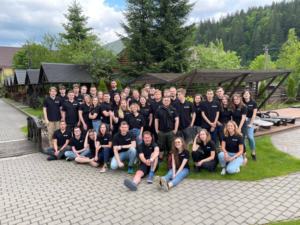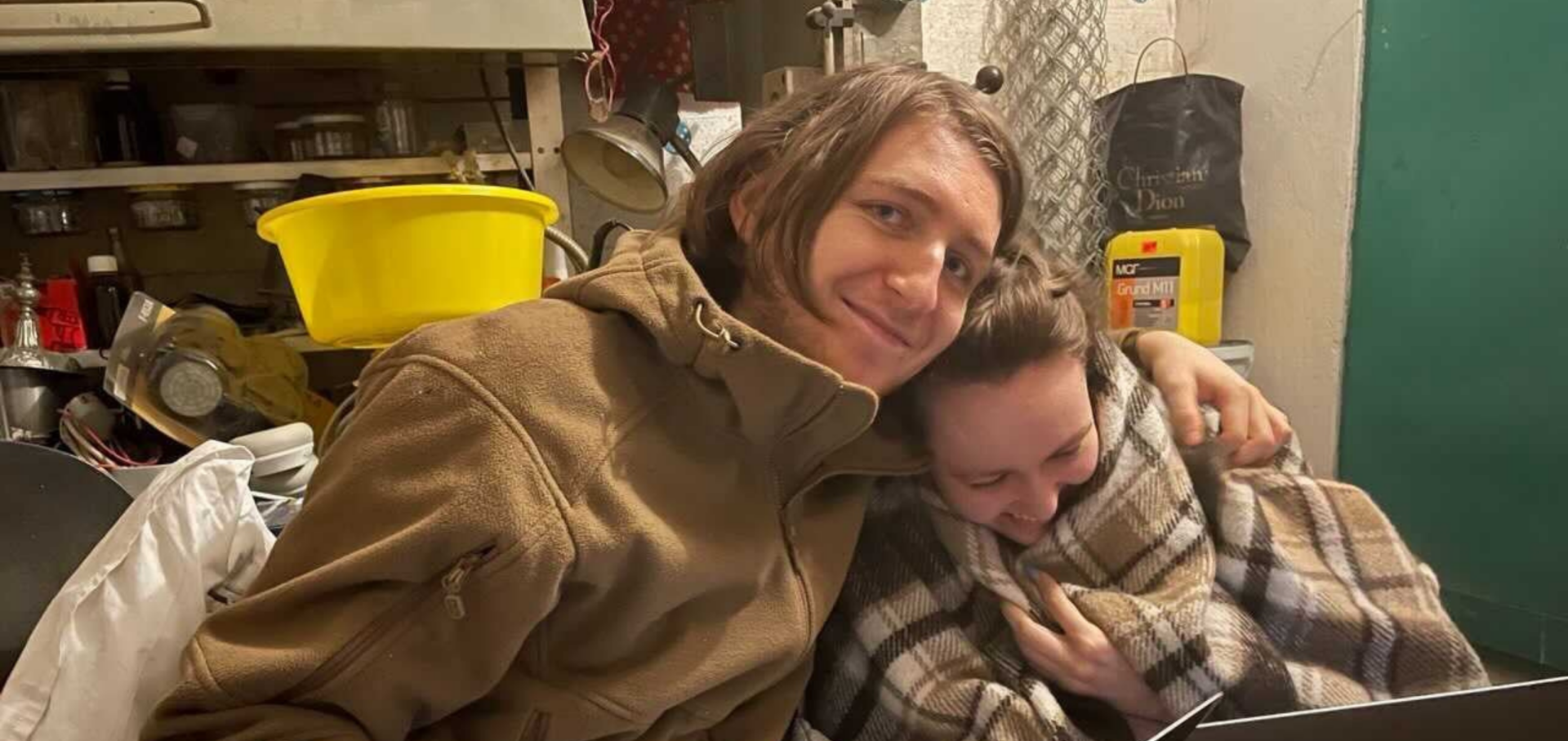Tech on the Front Lines in Ukraine
Editor’s Note: Over the last two months we have published stories highlighting the work Carmel-based companies Swan Software Solutions and Authenticx have undertaken to support members of the Ukrainian tech community. Now, we bring you a perspective from members of that community itself.
It’s been three months since Russia’s unprovoked invasion of Ukraine and the world has been inspired by the incredible resilience and bravery of the Ukrainian people—including members of Ukraine’s tech industry. We are the team of Fulcrum Rocks, a Kyiv, Ukraine, tech company, and this is our story.
The war has broken and extinguished too many lives already. Nothing can bring them back, but it has also united the nation like never before, and Ukrainian tech is proof of that. As challenged as we are currently, Ukraine’s tech community continues to demonstrate great resistance—launching volunteer initiatives, donating money to the army, and other efforts in the struggle for victory. Even in the last several weeks, Ukraine’s programmer community managed to raise 30,000,000 Ukraine hryvnia (UAH), which is close to one million U.S. dollars, in a single day to buy an unmanned aerial vehicle (UAV) for the army. This is one of many such stories.
Meanwhile, missile strikes have destroyed comfortable tech offices, and many IT professionals have traded their laptops for rifles.
“This war has brought many challenges for Ukrainian tech companies, forcing us to refocus and rethink our strategies,” said Ihor Prokopenko, co-founder and CEO of Fulcrum Rocks. “Now, almost every tech company in Ukraine works for two front lines: helping our country win victory and freedom while struggling to save our business.”

Photo courtesy of Fulcrum Rocks.
Our nearly four-year-old team at Fulcrum Rocks has around 100 people on staff working with customers from across the world, including such big players as Buff (the first-ever Israeli gaming platform that entered IPO), Mercedes-Benz in Ukraine, and startup parenting company Bloss.
During the first days of the war, the entire Fulcrum team had to relocate in order to ensure that everyone was safe and had all necessary support. “Luckily, we’d thought of an action plan for a war-case scenario in advance, but, like many others in Ukraine, we didn’t believe it could happen,” said Prokopenko “So, when we woke up from the attacks on February 24, we were shocked but prepared. In the first four days, we relocated almost 70 percent of Fulcrum’s team to the safe spots and managed to return to normal work fast.”
Yet, not everything went according to our ‘plan’ – we had several team members stuck within the territory of active military operations. One of our business analysts, Kseniia, couldn’t evacuate from war-torn Chernihiv during the first days, so she had to spend weeks under constant shelling without electricity, gas and other essential facilities. We feared the worst every time she didn’t answer or was unavailable. The whole time, however, Kseniia stayed positive, and even volunteered to support other citizens. Luckily, she managed to evacuate safely soon afterwards.
“Overall, we could see that everyone was devastated by this war, so to support our people we held regular meetings, communicated frequently and hired a corporate therapist,” Prokopenko said.

Photo courtesy of Fulcrum Rocks
With this backdrop, Ukrainian tech companies had to deal with ordinary business concerns. Companies like Fulcrum, which works with international clients, had to alleviate concern from clients about their work product. Some of these clients started to look for other vendors outside Ukraine to ensure steady work flows. To ensure their long-term stability, Ukrainian tech companies had to keep delivering projects well and on-time despite frequent and sometimes constant air raid sirens.
In Fulcrum’s case, our team returned to normal workflow in just days following the invasion. We were, and are determined to keep growing. We reinforced our marketing efforts and restarted the recruitment processes. During these last three months, the company has already signed five new clients and hired more than 10 people, a growth of 10 percent of our team.
“At first, we worried that our clients would drop us, and we would have nothing to do,” Prokopenko said. “We understood that it could happen. But instead—we received a great deal of support from our customers who really stood with Ukraine as well as our team. They donated money to our country, offered to host us and our families, provided places to stay, launched free initiatives for Ukrainians and spoke up everywhere about the war. It inspired us a lot, so we decided to reach our goals in spite of everything. Right now, we’re more ambitious than ever.We want to grow and create new projects to bring maximum help to our country.”
One way Fulcrum is fulfilling this ambition is by donating its profit to the Armed Forces of Ukraine.
“To provide more local and timely help, we also organized our own volunteer center which consists of our team members, and it provides equipment, food and any help for our soldiers or citizens,” he continued. “Just a few days ago, we launched a free platform to help Ukrainians find jobs in tech.”
Since February, the Fulcrum team has donated almost 4 million UAH ($135,367) and doesn’t plan to stop.

Photo courtesy of Fulcrum Rocks.
Fulcrum’s story is not an exception, but rather is a rule. Ukraine’s tech community is demonstrating great resilience, bravery and determination during these hard times. As one of the biggest tech talent pools in the world with more than 20,000 annual IT graduates, Ukraine’s tech community is motivated and driven to grow and persist. Regardless of their location—in air raid shelters, in trains, in villages, in other countries—Ukraine’s tech experts claim their right to be called one of the most skilled and reliable tech nations in the world.
Despite all the hardships the war introduced, Ukraine’s tech community doesn’t stop with simply surviving. It demonstrates a selfless desire to help the country win by all means. Ukrainian tech professionals go beyond what we thought was possible to provide financial, volunteer and cyber support. Thanks to such work, our country has managed to preserve full access to all essential government services. In the past few weeks, Ukrainian tech professionals launched a large-scale cyberattack on the biggest Russian video hosting platform, Rutube, bringing it down just before May 9.
While Ukraine’s tech responds to the invasion, tech companies from across the world donate money and create their own volunteer hubs. For example, unicorn Grammarly donated all its money earned in Russia since 2014 to support Ukraine.
Resilient as it is, Ukraine’s tech community needs more stable ground to stand on. What can be done to demonstrate solidarity and support companies like Fulcrum? The most effective help would be to keep investing in Ukraine’s tech sector and continue working with companies here, such as the work Indiana-based Authenticx does with Ukrainian company SoftGeneral.
Despite uncertainty, many international investors have already started to return to Ukraine. One by one, companies are announcing their decisions to invest in Ukraine’s tech community or to work with the teams from there. In May, Ukrainian startup PeopleForce secured investments from Poland’s Pracuj Ventures, and just a few days later, the Lithuanian furniture store Furniture1.eu announced an investment in a similar Ukrainian project, Mebelok. Regardless of the risks war brings, they still see great investment potential in Ukraine. Such a positive vibe brings a great change for local business as well as the economy.
The next time you’re looking for a new vendor, partner, employee or investment, we encourage you to think about Ukraine. Our tech professionals are committed to demonstrate great results, land new projects and find long-term partners. These dedicated individuals managed to deal with risks the war caused, and have proven that they deliver a top-notch service no matter what.





